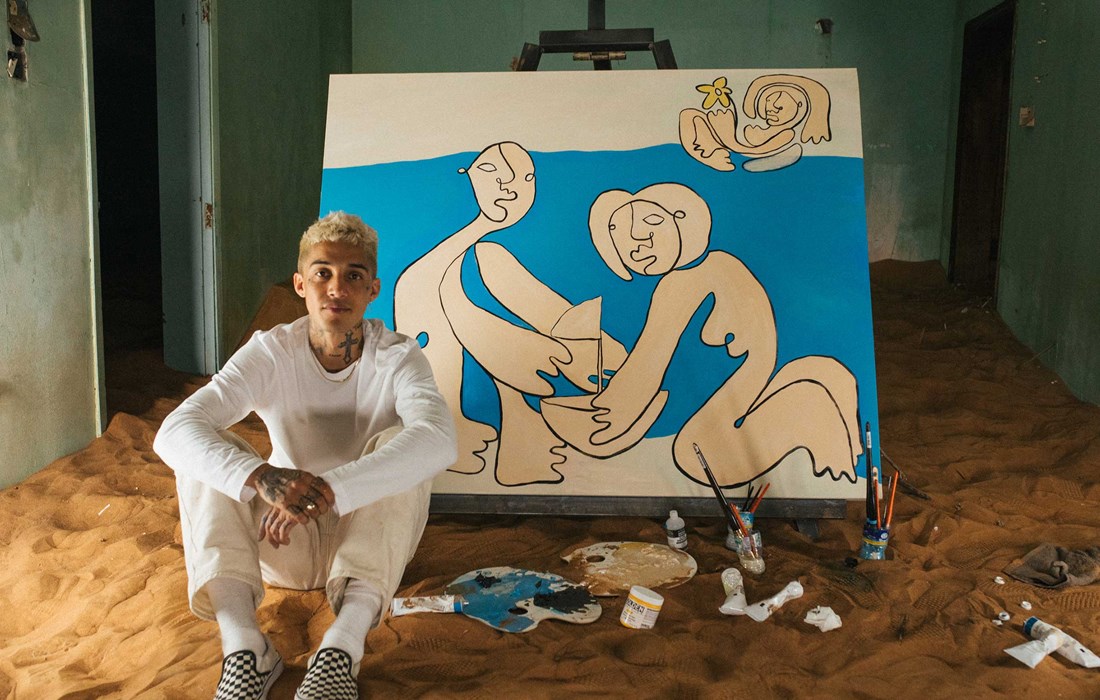Despite being diagnosed with multiple sclerosis (MS), Demitrius Omphroy (33) played for MLS side Toronto FC and was capped by the Philippines. He retired early into his football career and now works as an artist.
I grew up in California, but I was scouted by Sporting Lisbon and invited to their academy when I was around 16. I was due to sign a contract when I turned 18, but shortly before my 18th birthday I started having blurry vision and I returned to America, where I was diagnosed with optic neuritis. That was a bit of a nightmare. Everything that I tried to accomplish and work towards was turned upside down overnight. When my sight improved, I decided to return to playing and was scouted to go to U.C. Berkeley and play for them. I was an art major. In my final year, I was drafted to play for Toronto FC.
When I was playing at Berkeley, I developed a numbness in my foot. An examination found that I had MS and that my earlier blurry vision was an initial manifestation of the illness. It happened so quickly and so out of the blue. In a way, I was relieved as it helped me understand what had happened four years earlier. But it was also scary to feel there is this unknown and that I don’t know what this disease can do to me. The worst-case scenario, aside from dying from it, is that I can end up in a wheelchair and not be able to play the game I love.
I played a year in Toronto and was then due to sign with DC United, but I walked away from that contract. I needed some time to re-prioritize my focus. I was confused about my diagnosis with MS and went on as a National MS Advocate Speaker, talking to other patients and doctors to provide hope, while also educating myself about the disease. Midway through that year, I was ready to step back onto the pitch internationally. I had a chance to represent the Philippines national team and I took it without hesitation. They are not the strongest nation in terms of football, but it was a humbling and awesome experience to represent a country that my grandparents are from.
I retired in 2013 when I was around 24. It had nothing to do with MS. If anything, MS was the reason why I wanted to continue playing, to prove to myself that I could play.
But I asked myself if I really wanted to continue playing. I felt I am so much more than a professional footballer and I started thinking about what I was going to do once I finished. I always dabbled in multiple things, but ultimately felt I would stick to football because it was what I’d always done. Yet I always had a little bit of doubt.
Even though I had signed a contract, had a sponsorship deal, and people recognized me, it was not what I expected. I kept on thinking, when am I going to start really enjoying this? I think I just never did. I then realized that I didn’t want to be just a footballer. I wanted to be something more – and I was something more than that always. I wanted to try to find other outlets. There was this stigma that athletes are stupid, that they don’t care about education. I always did well in class, so I knew I could do more. I was always much more than what I was doing.
I ended up stepping into more of a creative role. For me, it was all about expressing myself in different ways. One was on a pitch. One was behind a camera. And, now, what I’m currently doing is on canvas with a paint brush. Some of the challenges to becoming a footballer are the same that I faced becoming an artist. Many people want to be a professional athlete, but the reality is that not a lot of people make it. It is just as ambitious to say that you want to be an artist. But I wanted to show everybody that I could. And I wanted to show myself that I could.

I was always interested in art, but I was told you can’t make money as an artist and if I insisted, I was going to live the starving-artist life. Even knowing how much I love football, there is something about creating; something about being an artist, painting and expressing myself that way.
My mother was an artist. She used watercolors and oils and painted mainly still-life and landscapes. It is difficult to describe my style. It is like expressionism, like modern contemporary. I don’t want to say pop or commercial, but it sits right in the middle of those three or four things. Possibly it is considered contemporary modern expressionist.
There has been a lot of research about MS. For me, it is mainly about having a good relationship with my neurologist and getting on a drug therapy. There is no cure for it, but because it was caught early on, I can have a normal manageable life with very minimal relapses or episodes. Ultimately, I think I can live a fairly symptom-free life, something that would not have been possible 20 years ago.